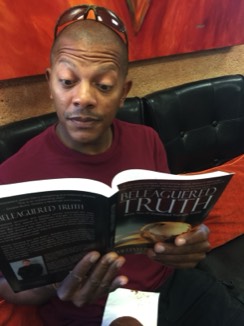
Prologue
December 28, 2000
My wife and children were murdered in September. It was now December and the investigation had been going on for three months without progress. Lt. Tom Moran was in charge of the case. He was a skilled detective, but the murders had been flawless. It was only his knowledge of me, his closeness to my brother and my family that enabled him to suspect the sinister truth. But he had no evidence.
As Lt. Moran left my office, I knew I was safe. I had won. When the door closed, I stopped laughing. There had been nothing funny about our meeting. But then, I was not laughing out of humor, I was laughing from disdain. We had grown up together and I knew all his strengths and weaknesses. I would have respected him if he had shot me. But he didn’t. Instead, I was left with victory, contempt and a cloak of silence.
That last little item was essential. I was embarking on a completely new life and I knew that the public tends to cut more slack for entertainers and Hollywood stars than it does for politicians. The right person can even elicit empathy and warmth. No senator, for example, could mock his own life the way Frank Sinatra did in the song “My Way” and still maintain a strong constituent base. No. I would never be able to adequately explain myself. So why try? Silence would be my new spouse.
My name is Giuseppe Lozano and I am a United States senator from the State of California. Although representing the largest state in the Union, I am still only one of one hundred votes—a situation I intend to rectify. In the meantime...
***
Chapter 1
January 2001
I was elected on November 7, 2000, only six weeks after my wife and three children were murdered in our Los Angeles home. Historians will debate what effect those deaths had on the outcome of the election. They certainly had an impact on the campaign. My opponent, Anthony Gottesman, could not have been more temperate or judicious following the murders, and his restraint may have cost him the election. Regardless, I remain grateful. He gave me time and space in which to grieve. Anyone who read Lt. Moran’s account of the events may suspect me of cynicism. The truth is, I do miss my family.
During the six weeks following the election, the presidency remained undetermined. Although Al Gore won the popular vote by a substantial majority, George W. Bush was eventually declared the winner with a one-point Electoral College edge. In California there was no question about the senatorial race. My margin of victory was comfortable. And so, in the ensuing months I prepared for my move to Washington, D.C. But first, I had unfinished personal business.
***
I have never liked cemeteries. I find them artificial. The more magnificent the grounds and elegant the buildings, the greater their illusion. Holy Cross cemetery is modest by comparison with other Southern California graveyards. Still, it sprawls over the hills of Culver City, its gently sloping and sculptured lawns providing plots with spectacular seascapes of the Pacific Ocean. But to what benefit? It certainly is not appreciated by the dead. In the end, these places only exist to comfort the living. And for some, it works. A manicured grave creates calm: an opportunity to seek relief from pain; to find hope in loss; to soothe a disturbed conscience; to escape unresolved conflicts; to put the past, if not the dead, to rest.
Given that so many funerary grounds resemble city parks, it is not surprising that people plan picnics and family outings to visit the gravesides of their relatives and friends. But the dead are dead, and cannot be visited in any real sense of the word.
My wife and children were buried in the Visitation section at Holy Cross. By every standard, it was beautiful. And, of course, there was the ocean. But it was beyond their sight. Nor did the view particularly appeal to me.
Other than the burial itself, I had been to the cemetery three times after my family’s murder. Partly, it was an attempt to keep up appearances. In the waning days of the campaign, in the wake of the election and throughout the investigation, I had to be perceived as the grieving husband and father. At some point, I became aware that I was running. Not from the murders. Not from death. I was running from myself. Suddenly I realized that I could not relocate to Washington without visiting the graves unaccompanied. As the man I really am.
Very few people can possibly understand my feelings as I drove through the gate, parked my car, ascended the hill and approached their tombs. I had been responsible for their deaths, and from my vantage point, their murders served a greater purpose. But I also mourned their loss. I perused the surrounding grounds. Unlike my previous visits, I was not accompanied by security guards, and the media no longer chronicled my daily activities. I was alone. Or so it seemed.
I am not a man given to hallucinations. And yet, I could almost see the bodies rise from the ground. I felt an uncertain quiet envelope me. Haunted by their memories, perhaps tinged with guilt, I looked around again. No one. I was securely sequestered and alone with my thoughts. I began to speak aloud.
“Yolanda, kids, I’m sorry.”
Despite the fact that people often use those words when responding to tragedy, that was not an empty sentiment on my part. I felt a great deal of pain and loss. Besides, what other way could I begin? I wanted to reach out and hold them, but I could not. They were dead and I was ringed by isolation. I was not prepared for these feelings. I felt my knees begin to quiver and become unsteady. I had maintained control of these personal emotions, carefully locking them away for months. I could not afford to falter now. I had to remain resolute and focused.
This was not just about my ambitions. The world I grew up in, where I fell in love, the world I brought my children into, had ceased to exist. From my perspective, America was facing an unclear future and most politicians were unprepared or incompetent. I believed, I knew, I still know that I can do something special for this country.
Suddenly I had an eerie feeling that someone was watching. I glanced around again. No one in sight or earshot. It was just my imagination. That, or Yolanda was reaching from beyond the grave. But I don’t believe in restless spirits. Nor was it my conscience, for I wasn’t really looking for forgiveness. Still, she was with me. She had always stood by me, even when she did not approve of my decisions. Giovanni and Tom would never understand or accept what I had done. Without her, I had no place to turn.
I sat for a while, lingering longer than I had planned, unsure if I deserved to be that close to them. Finally, I stood and turned away. The evening was approaching as the sun slipped ever closer to the sea. I knew this was my last visit to the cemetery for there was no need to return. I had learned something that day in the city of the dead. The fallen cannot impart pardon or grant solace. The only peace I would find would come from speaking my piece, leading and influencing others. From that point on, I would always be alone. This, too, I knew was inevitable. I was prepared.
***
Congress is an interesting amalgam of people. The purest of politicians run for office to serve the common good. Others run to achieve recognition, to be or to become somebody, to escape a common, undistinguished, and potentially forgotten existence. Still others run to become kingmakers. Or at least prince-makers. To decide who climbs which ladder, how fast and how far. I ran for office for one reason only—power. And that power is not held by a kingmaker. I am not seeking to be anointed by anyone and I intend to be beholden to no one. For me the U.S. Senate is merely a stop. A stepping stone. My ambitions lie elsewhere.
While my name is not unfamiliar, my story remains unknown, save for two people—Lt. Tom Moran and my brother, Fr. Giovanni Lozano. Yet even they do not know me, for the events of any life are, at most, the building blocks for knowledge. In and of themselves, they do not convey understanding.
To truly know another person, it is necessary to link the facts of that person’s life with values and motivation. Even then, more than observation is required. Communication is essential. Giovanni, Tom, and I grew up together, and they have known me all my life. They possess many facts about me and so seem to think they comprehend me. They do not. Our values parted ways when we were young, and over the years I kept my own counsel as regards motivation. Tom and Giovanni will never understand me. They will forever inhabit a darkness they cannot fathom.
***
My parents, my sister, and her family all attended my oath of office in Washington, D.C. The solemnity of the U.S. Senate prohibits photography in the chamber itself. Notwithstanding that tradition, cameras are essential in the world of politics. So, although the actual oath is administered during Senate proceedings sans pictures, a reenactment takes place in the Old Senate Chamber, photographers eagerly welcomed.
During the official ritual, a newly elected senator is escorted down the aisle by another senator, frequently from the same state. I know the importance both of tradition and appearance. A woman leading me down the aisle would play well in my home state. Barbara Boxer and I both represent California, but since she is very liberal and I wanted to demonstrate my fealty to the Republican Party, I asked Kay Bailey Hutchison of Texas to escort me. Still, I could not ignore that I had been elected from a left-leaning state. For purely symbolic purposes, I asked Boxer to accompany me during the reenactment. The photos of this second rite would cement my commitment to all the people of California.
The monuments and structures of Washington are a majestic tribute to democracy. But the handsome intimacy of the Old Senate Chamber sets it apart, evoking memories of a storied past with senators enlisting elegant rhetoric in their efforts to lead and preserve a nation. That was not just the Golden Age of the Senate; it was truly a more mature and elegant time of governance.
Above the vice-president’s desk a gilded eagle keeps perpetual watch over a fledgling nation with the depth of a mother’s pride and anticipation as one eaglet after another takes wing. Documents lying upon various desks resurrect the discussions and disputes of ages past. Standing within those walls one can almost see the great orators rising up to engage each other in the debate over slavery: Daniel Webster, Henry Clay, John C. Calhoun, Robert Hayne, and Stephen Douglas. Within that room, I had one of my rare moments of uncertainty. Would I be able to live up to the standard set by these predecessors and lions of history?
Neither Giovanni nor Tom was in Washington for the swearing in. Nor had they attended the family Christmas dinner the previous month. Though both of these absences were highly unusual, the circumstances surrounding the death of my wife and children forestalled normal suspicions. Both men had professions capable of masking reality with passable explanations: Giovanni claimed that parish duties required his attention, while Tom was still officially pursuing the murder investigation. I saw no reason to steal illusion from the family. And I was not in any position to reveal the truth. They were not in Washington, and no explanation was needed. Unfortunately, my sister, Bianca, fancied herself the family problem solver. She knew that we were all affected in different ways by my family's deaths. Still, she sensed there was something more at work. As we exited the chamber, she pulled me aside and began her own mild inquiry.
“Sep, what’s going on with the three of you?”
Bianca was not given to an overabundance of subtlety. Neither did she need to explain the reference. We three men had been so inseparable as children that people could barely conceive of one without the other two. Like many a myth, that impression persisted long after our lives diverged in adulthood.
“Nothing.” I hoped that my response was neither too quick nor too curt. Then I softened my reply with, “Why?”
For a moment I was transported back to my childhood, for it was a child’s response, not unlike a mischievous boy trying to veil the truth about the frog in his pocket or the grasshopper in the jar. My sister continued, “I have not seen the three of you together since Thanksgiving.”
That was more than just an impression. It was, in fact, the last time we had been together. Tom’s mother had invited our entire family over for the holiday dinner. At that time, my brother and Tom had no way of knowing the truth behind the murders. For now, I was in no mood to pursue this conversation with Bianca. But how would I exit gracefully? I thought, Hell, I’m a politician. This should be easy.
“Look, sis. You know them almost as well as I do. I think they have been riding emotional waves since September. We all have. And we each have to deal with it in our own way. There are times when being around family is comforting and supportive. There are also times when it is just too stressful. Even recalling good memories can be burdensome. I imagine that deep down they both would have liked to be here, but I decided not to pressure them about it.”
I hoped that would put her concerns to rest, at least for a while. She was not naïve. On the other hand, she tended to believe me when I spoke. And, for the moment, it seemed to work.
“Maybe you’re right, Sep. Things just aren’t the same. I guess they never will be. But I would hate to see the three of you drift apart. You need each other now more than you ever have. Just remember that.”
I had no desire to pursue this line of conversation and certainly could not tell her the real reason for their absence. I managed a disconsolate expression and said, “Thanks, sis. But I assure you they have not forgotten me. We had dinner together every Thursday until after the election. Following that, I was too preoccupied with setting up my office and residence here in D.C. Listen to me. I know you love us. And I appreciate your concern. But you don’t have to worry. Everything will be fine.”
Of course, that was not true. Nothing would ever again be fine among the three us. Still, she seemed to believe me and I found myself easily slipping into the role of professional politician.
PURCHASE NOW








